William Conger is an accomplished Chicago painter. This conversation with William focuses on the common elements we all share; seeing the world as a child, expectations set on us by parents, expectations we set for ourselves, and making our way in the world. The unique thing about William is that much of this is revealed for all of the world to see - in his art. Music credit @ketsamusic
Experience 083 Painter William Conger
Additional Information




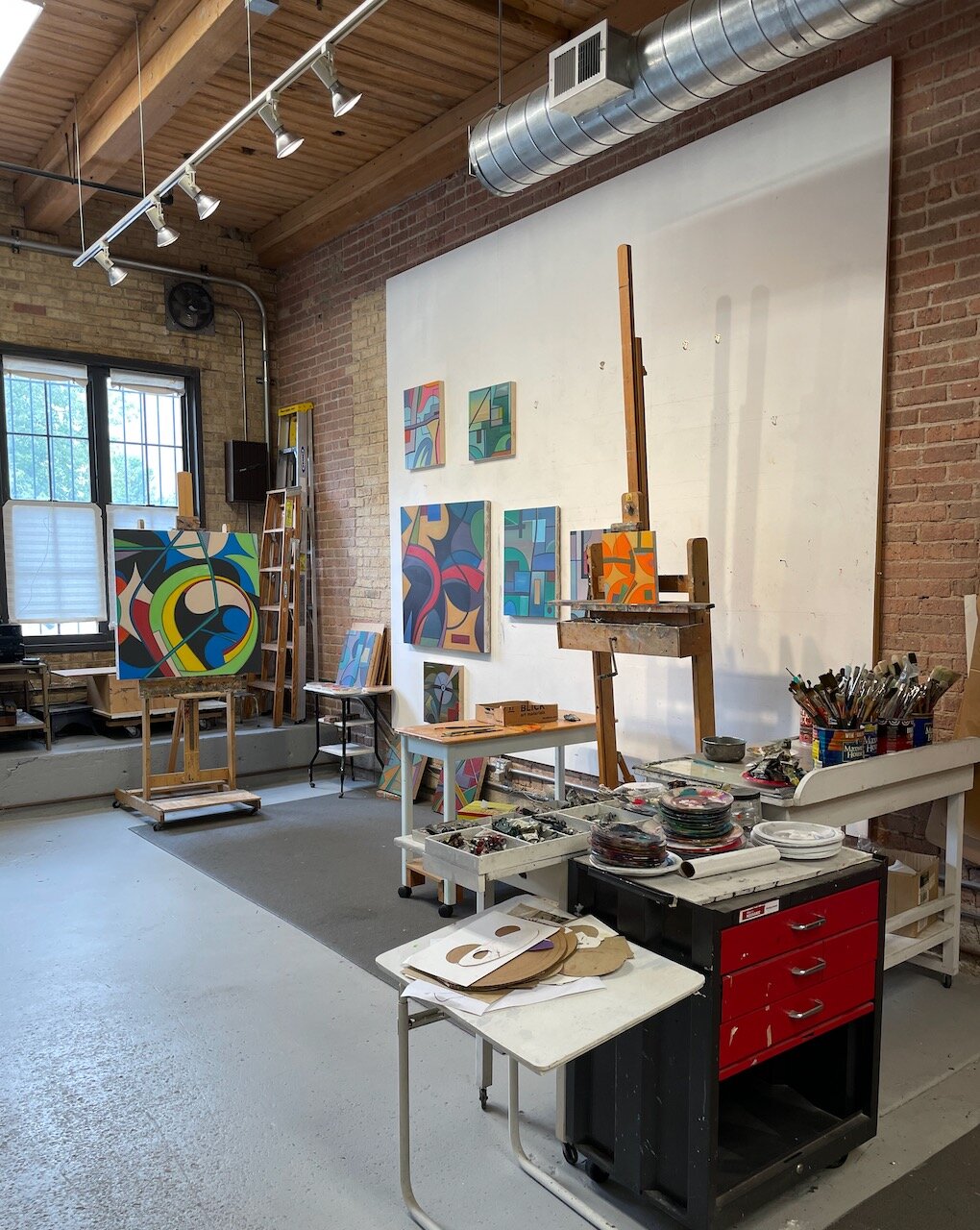
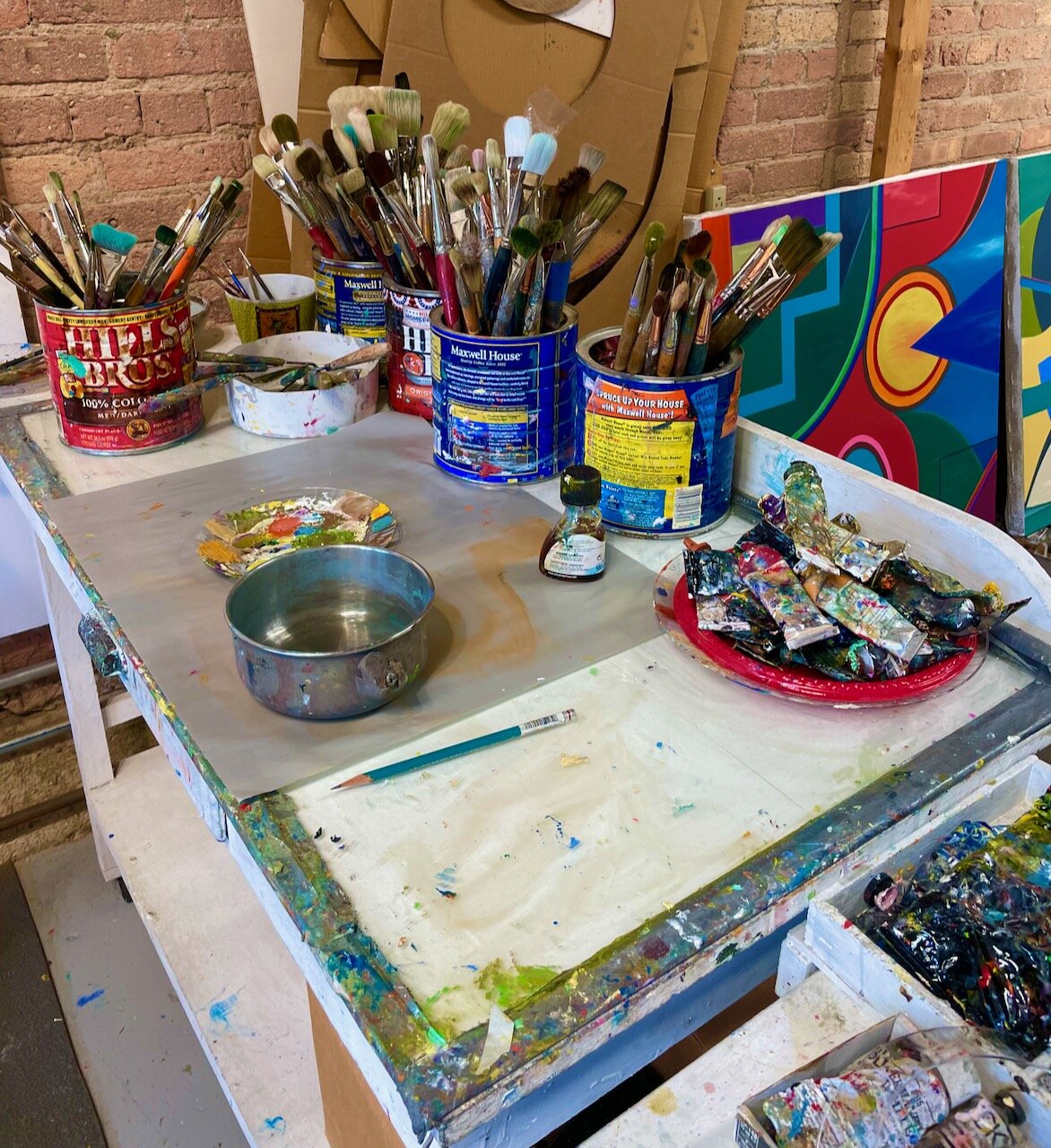
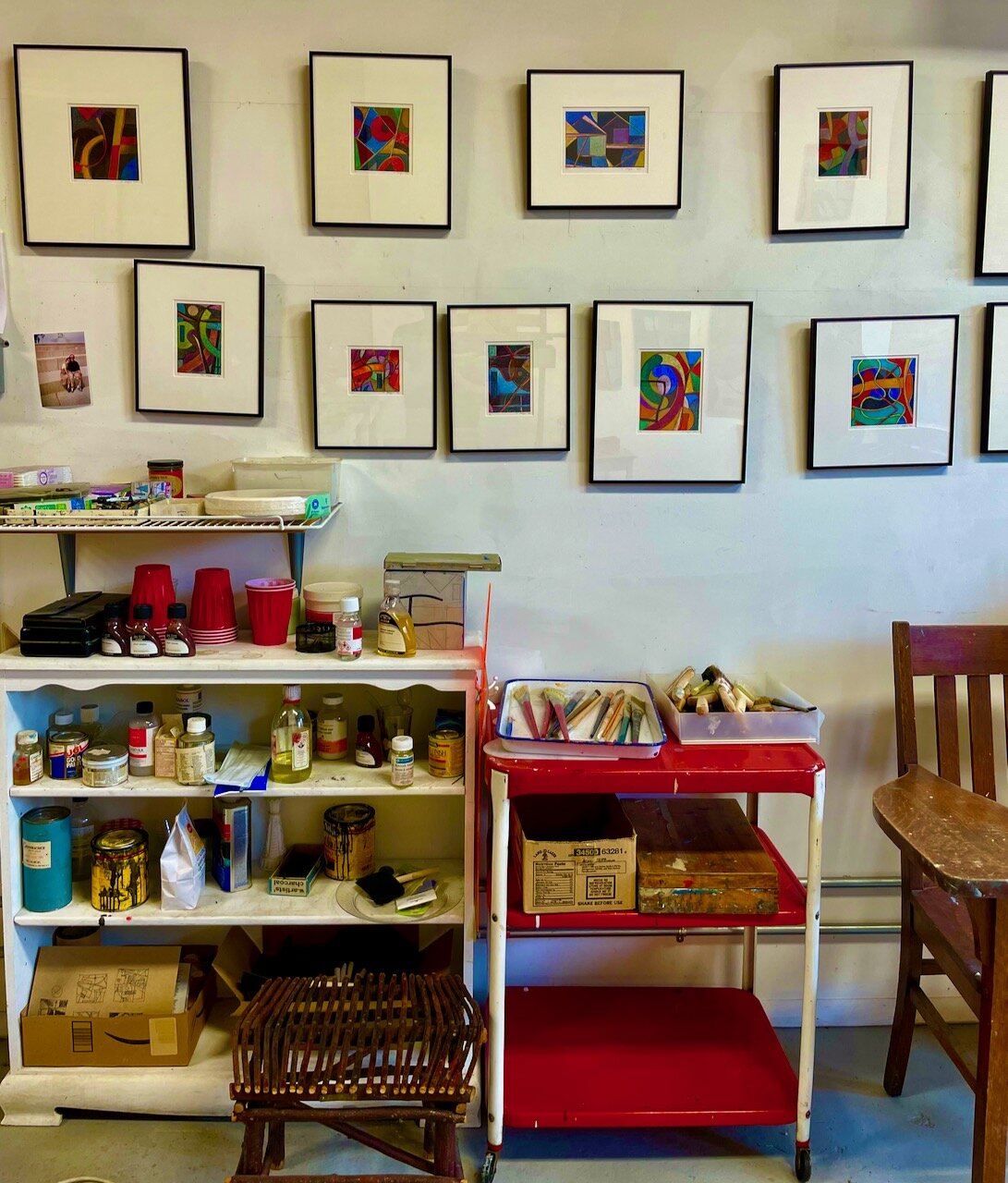
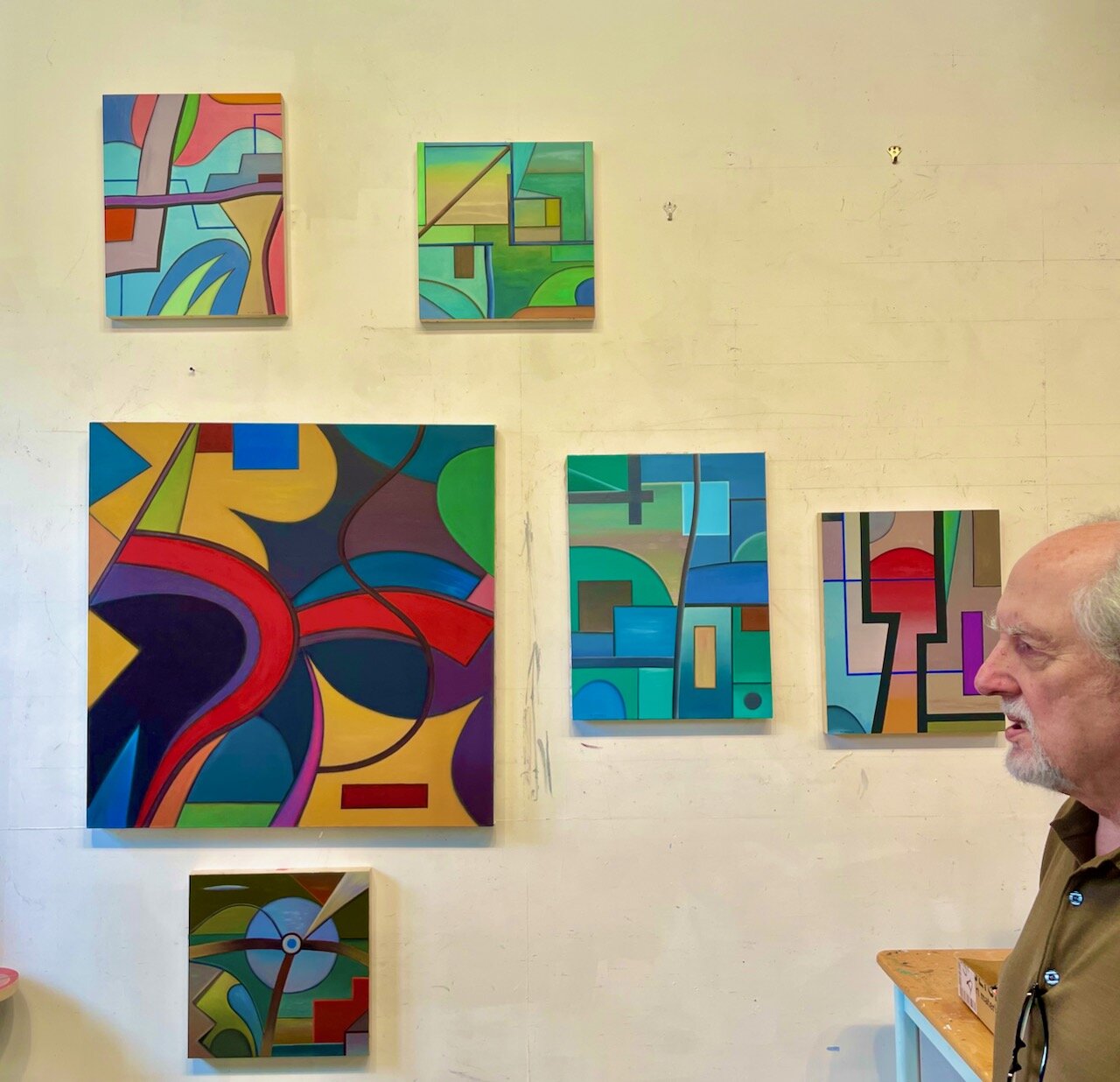
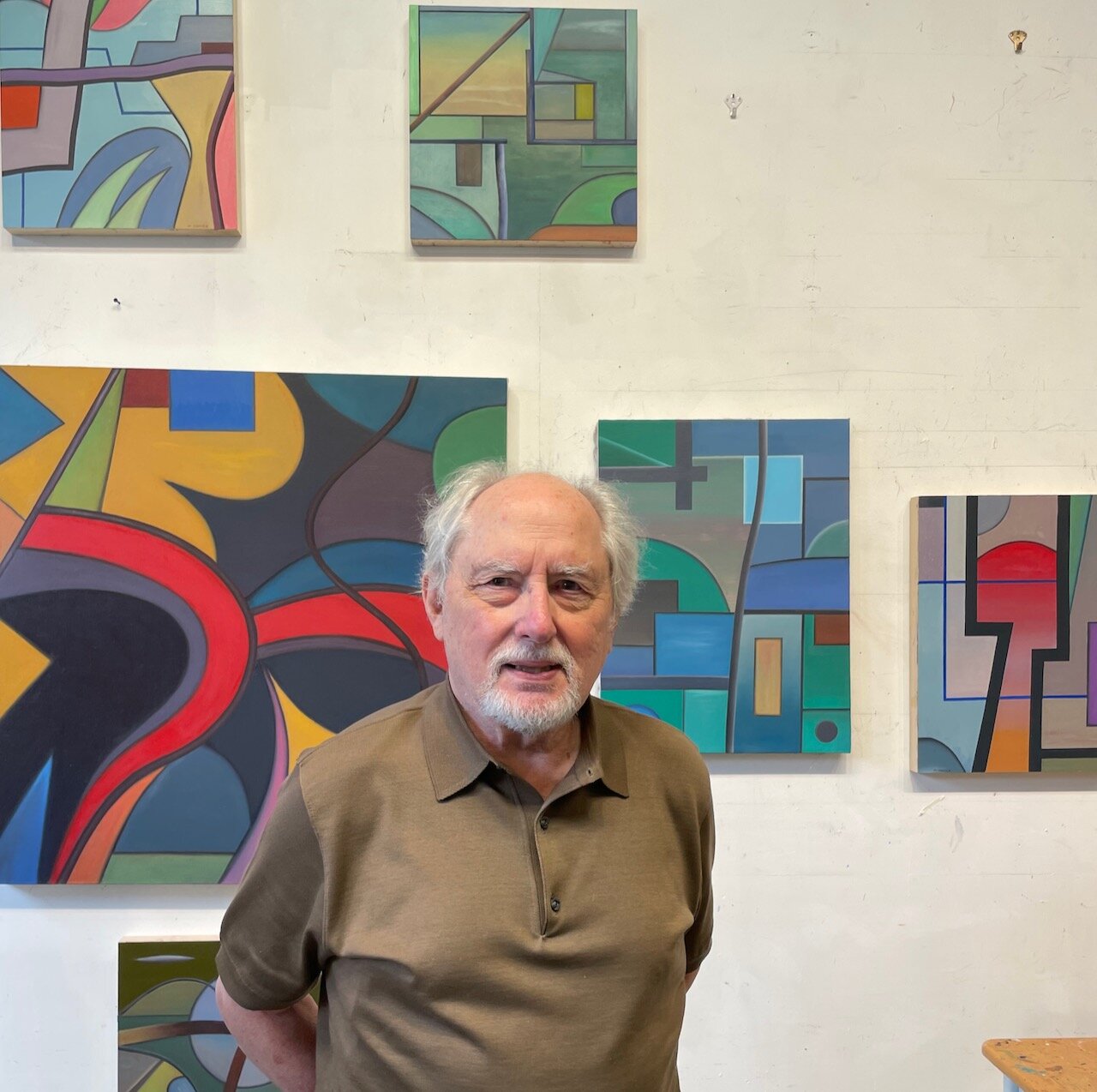
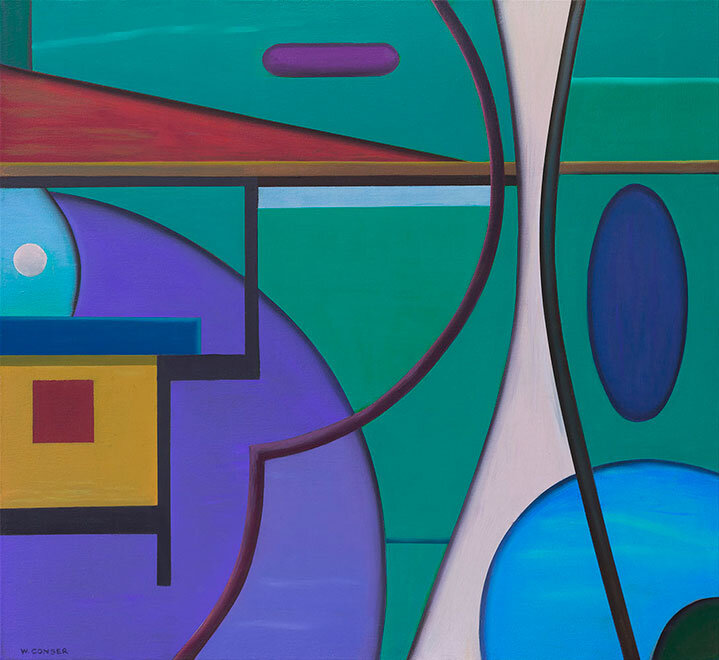
RELATED LINKS / Artist and artwork mentioned in the show
https://www.artic.edu/artworks/105533/broadway
http://www.artnet.com/artists/elaine-de-kooning/
Connect with Ricky and the EAGER TO KNOW Community
SHOW TRANSCRIPT
Ricky McEachern (02:16):
William, thank you very much for taking time to meet with me. We're here in your studio. And the first thing I want to say is your studio is incredible.
William Conger (02:25):
Thank you, Rick.
Ricky McEachern (02:26):
When I think of an artist studio, this is exactly this is exactly what I would think of beautiful light, beautiful space. And you know, surrounded by all of your artwork. Yeah.
William Conger (02:39):
I'm very comfortable here. I've been here 20 years. Yeah. I had another space elsewhere in the city for quite a few years too, but I ended up here. I like it.
Ricky McEachern (02:51):
Now, do you come to the studio every day? Well, I try I'm,
William Conger (02:55):
You know, I'm older now, but I do get here almost day. Perhaps not as long as I used to work, I used to work 10 or 12 hours and think nothing of it now, five or six. Some days I can't get here, I have other obligations, but I do try to get here on a regular basis.
Ricky McEachern (03:15):
You're working 10 or 12, 12, 10 or 12 hour day where you usually working. I'm sure it was different every day, but would you work on one painting for that entire time or would you be mixing it up and doing different things throughout the day that 10 hour period? I
William Conger (03:30):
Usually had a few projects going but normally I would devote myself to one work at a time and of course it became necessary to sometimes work on something else because paint, I use oil paint and it was wet and so forth. So I'd have another project going, maybe a smaller painting or doing something on paper. But generally I would stick to one painting as the central focus and then have other things to experiment with or to develop alongside that's
Ricky McEachern (04:05):
A long time to be focused on one thing. You know, I think most jobs that people have, you know, even though they're doing you, you know, usually you're not focused on one thing like that for that period of time. That's true. Is that something that, are you like a focused person in your life outside of the studio or are, is it just when it comes to painting? You're able to do that? I think I'm pretty
William Conger (04:31):
Organized. I think I, I, my outside life is organized in order to preserve the time and integrity of my studio life. So I like to get things done of so that I can be free both in terms of time and mentally when I, when I come to my studio. But when I come here in the morning, I generally start right to work. I'll get something going right away. I don't sit around and wait for inspiration or anything like that. I just get to work. Like what
Ricky McEachern (05:03):
You said about your outside life. Like it's sort of supporting you, being an artist is around that. Yeah. I feel the same way. I'm very much into fitness. And one of the reasons why I am is because it helps me be a better painter. And I know that sounds crazy to some people, but I, you know, I can't paint if I'm not feeling well, if I'm like hung over or something like it's not going to work. I have to be the more fit I am and the better I'm eating and the better my mood is the better, the the more effective I'm going to be in the S in the studio. So you grew up in Chicago and obviously being growing up in Chicago and being in Chicago, the lake is a big part of the city. And I did not fully appreciate that. Obviously I didn't grow up here. I grew up in new England. I didn't realize how big a part of the culture and the Mo it's in people's mind all the time. And it affects your artwork. Ultimately, I,
William Conger (06:08):
I recall the tremendous differences in sounds and character between the city and the lake or the park when I was a youngster, because in those days during the world war two, there were a lot of factories, smaller factories in the area, just west of where we lived. And you could hear them start up in the morning and you could hear the, the horns and the whistles. And then there were still the old street cars that rattled a
Ricky McEachern (06:44):
Lot of the road smells for their smell and the smells
William Conger (06:47):
And the, the people who would roam up and down the alleys, selling fruits, or wanting to sharpen knives, or get rags or whatever the case might be and delivering. And as soon as you went to the lake, it was silent. So the silence of the lake and the fog horns, there were a lot of it was a lot of shipping on lake Michigan in those years because they were bringing or down to you know, Calumet in Indiana to the steel mills. And so just constant fog horns that one would hear in the morning when I take the family dog out for a walk, I could one side here, the fog horns, a very mournful kind of sound. And then on the other side, the clanking and the whistles and the, the noise of the city awaking up. Yeah. So it's two,
Ricky McEachern (07:45):
Two worlds that are basically adjoining. It's a very interesting dynamic.
William Conger (07:50):
Yeah. In fact, I really kind of put that all together in a painting I did in the early eighties, which I called Broadway Broadway was the first commercial street west of where I lived as a kid. And that was really the dividing line between the quietness of the more residential area of Lincoln park and the more urban factory centered area. And so I did a large painting, which happily was acquired by the art Institute a little bit later which I thought kind of symbolize that merging of two worlds an urban world of energy and action and a more melancholy, if you will world of the lake, my aesthetic sensibility is shaped by the, this contrast between energetic, active, maybe even violent versus a very quiet and reticent moody kind of space. Cool.
Ricky McEachern (09:06):
I want to talk about your childhood as it relates to seeing yourself as an artist. Did you, can you tell me about that? Did you see yourself as an artist, as a kid? How did that happen?
William Conger (09:20):
It happened early. My mother was a kind of an amateur artist and she would take me to the art Institute on Saturdays. I remember that explicitly and we would take the, the brand new subway and go down to the art Institute. And I just loved it. It was, it was so spectacular to me and I basically memorized everything I could see there. And what age was this? Four, five and a five. And I just loved it and I memorized these paintings and where they were. And looking
Ricky McEachern (10:01):
Back at that, five-year-old like, what do you think? Cause most five-year-old, five-year-olds five-year-old boys don't have that kind of reaction to going to a museum. What, what do you think about that? Like that five-year-old kid? Well,
William Conger (10:16):
I don't know. I mean, for me, it was just a, the best experience and the most adventuresome experience I could have. And later on when our own children were around that age and I was of course eager to take them to the museums and to the art Institute, they were well more like normal kids. Like, you know, when can we go get something to eat or when do we go home? And, but of course they did eventually become very interested, but I think it is, I don't know if I was at unique or just a lonely kid who loved going to the museum with my mother, but I, I I did love it and we would get postcards of paintings and then I would try to copy them. And so early on, and then when I entered the first grade, I was for some reason to ask, to do some illustrations or something, cut out things that would go on the school bulletin board.
William Conger (11:17):
And of course I just loved that. And I, I guess I did a good job because everybody liked it. And so when I was asked what I wanted to be, when I grew up, I instantly said artists. And so from the first grade on, I was claiming to be an artist. And it finally got to the point, well, I better live up to it. Now, my father worked for encyclopedia Britannica. And of course in those days, those encyclopedias had lots of illustrations. And I do recall on Saturdays, sometimes he would take down to the office and there I met an artist. His name was Dale Nichols. And I thought he was the greatest artist on earth because I'd seen some of his illustrations. I'd seen a few of his actual paintings because Britannica had a fairly good collection of American art that was hung in the offices at the, at the company.
William Conger (12:20):
And so I could see his paintings. And when I met him, it was like, you know, going to heaven. And he was a very wonderful gentleman. And and I still admire his work tremendously. A lot of artists, a lot of very important artists, you know, really worked their day job as a illustrators like Edward Hopper and so forth. Andy Warhol, Andy Warhol, Reginald marsh, I mean a lot of them, and that was not a, there wasn't a division between the commercial and the fine art that came to exist after universities developed their own fine art departments.
Ricky McEachern (12:59):
So let's talk about that. Let's talk about formal training. When did you start getting formal training or any, I guess you probably had art class in school, but when did someone actually teach you how to paint
William Conger (13:15):
Totally parochial or Catholic school? And of course art was not part of the curriculum and a beginning in the fourth or fifth grade. I think they had a teacher come in once a week to spend an afternoon with the kids, you know, doing some project. And so I was very interested in that. And I do recall that my great moment is when this person came in a woman and she asked us to draw a picture of something in our neighborhood, I think, and I did a drawing of a postman delivering mail, and I would send the fifth grade. So I was nine, 10 years old. It was remarkable by the standards of other kids who were well, he put these works up on the bulletin board and most of the kids would draw stick figures or something like that. And mine was a fairly, you know, fairly convincing drawing of this mailman, you know, hunched over by the weight of his mail bag, walking along the sidewalk. And she thought it was remarkable. And she said that, well, you should go to the school of the art Institute for junior classes. And so I did, my parents said, okay. And so on Saturdays thereafter, I began taking classes at the yards to school of the art Institute.
Ricky McEachern (14:42):
Were you taking classes, the classes with kids or your dog
William Conger (14:46):
Youngsters have a similar age
Ricky McEachern (14:49):
Group? What type of would they teach at the art Institute, kids that age? Like what was it? Well,
William Conger (14:55):
It wasn't very sophisticated. They had long tables set up, I recall. And then every conceivable color mixed up pre-mixed it would all be a kind of a water color, temperature colors, really in those days acrylics were still still a little bit we're not knowing. And so it was a kind of a temper color, which all kids had used at one point or another, but it was in big quantities with big brushes and big sticks of crayon and charcoal. And all of a sudden you are just, you know, overwhelmed with the the, well, the professionalism of it all. It looked so big deal. Yeah. Did you like that? Oh, I loved it. And we would, there would, it would set up little, still lifes, nothing really complicated, but, and I tended to follow the, still I tried to do something, but mainly I was just interested in all that fluid paint, you know, it's just fantastic.
Ricky McEachern (15:57):
Did you feel that being with other kids that were artistically inclined that you found your group of people, or like, did you feel like you were related to them?
William Conger (16:10):
I was very competitive. Okay.
William Conger (16:13):
I was interested in, you know, how good are they and am I any good? Are my better, or am I worse? Or is that kid better than me? I mean, I was all, you know, I was competitive. So it wasn't so much that these were my teammates. These were my these are the people I could be measured against or measure myself against. My mother was very supportive of my interests. My father was really not, he was a businessman and he wanted to look forward to seeing his son follow him and his career path. And he looked forward to, to me being like that his own father had died when he was very young. And so he essentially grew up having to carve out a place for himself in a very competitive way as a student, as a, a young person, trying to make it in the middle of the depression. So I think he instilled in me the sense of, you know, do a good job, but maybe I was competing in a way to prove to him that I could do this. And that I'm good at this
Ricky McEachern (17:27):
Had ever explicitly state that he didn't want you to go into art and that he wanted you to go into business. Yeah.
William Conger (17:33):
Yes. There are many, many occasions. Yeah. He I was very tracked later when I went to the school of the art Institute full time and at which I had applied to, without anyone in the family, knowing it. And then when I was accepted, I just presented the letter of acceptance to them. And they really, at that time had no idea what I was going to do after I finally finished high school. He thought I would go to a junior college or something and try to get me warmed up for a serious college because I had been such a poor student. But I got into the school on a basis of a portfolio and such that I presented. And so then I did go there for a year, but during that whole year, I was badgered in a way and made very uncomfortable about that. I liked it there. I had Adger by home. Well, by my father mainly you know, in his own way, he would just didn't understand why I wanted to do this. He wanted me to go to a real university. And did
Ricky McEachern (18:43):
He did your dad ever understand at any point?
William Conger (18:49):
No. I'm afraid not. He died young. He died in his early fifties. And so he really, at that point, I was still pretty much hit C in terms of my own development and career. So unfortunately he didn't know that I actually did put it together and my mother had already died. So I was you know, on tour in those terms in those days, I was an orphan at early twenties. Okay. Which seems old enough now to make it on your own, but it was tough.
William Conger (19:23):
Yeah. Well, it's tough not
William Conger (19:25):
To have anyone to, I really didn't have any relatives that could help me or do anything for me. So I was really on my own and that really turned up the dials in terms of you better go out there and figure out how to make a living at this. I mean, I did eventually go the second year to the university of New Mexico, which had been suggested by a friend who was also an executive at PIR Taneka. His name was Walter used and he was the editor in chief. And Walter used was different from all of his colleagues in the company because he was an artist and a pretty good amateur artist. And he lived in Evanston and I would go to his home on weekends and we would paint together at that time. My father had, was encouraging my association with Walter used because he was a kind of a prominent intellectual.
William Conger (20:18):
And he thought he could convince me that I could continue my artist's interests. Like Walter used to it as a, an accomplished amateur as a hobby, and then still be a successful in business and which he was. And so that was the idea of that. But Walter yous was such a wonderful man. He, he really thought I was doing really well. And, and he encouraged me to go away to school to get away from home and this pressure, and instead go to a school where he knew somebody that he admired. And that was the university of New Mexico. And what did you study there? Well, I, I went in as a, an art major now, but I also studied philosophy. I became very much interested in and philosophy. And so I, I really bridged two, two fields while I was an undergraduate art and philosophy.
William Conger (21:24):
And I did meet and was mentored to some degree by Raymond Johnson, who was the person that Walter used, had known so well. And Raymond Johnson was a very prominent American artist who had gone to the Southwest to settle some years earlier. So he was very encouraged. And so all of a sudden I was surrounded by very encouraging people both artists and my professors and philosophy. And so suddenly I had, you might say kind of surrogate parents who were more interested in, in what I had to offer instead of what they had to offer at New Mexico. I also became friendly with Elaine de Kooning who had been, who went there too as a visiting professor. And she was remarkably helpful to me and she encouraged me a lot. And she wanted me to go to New York and so on. And she put me in a, in a show there in New York and that was reviewed in art news. And so I was still an undergraduate, but here I was seeing my, my work reviewed no, not in a big way, but there in a, in a major publication. So I felt like I can do this.
Ricky McEachern (22:54):
When did what you were creating, go from direct observation, you know, creating something from what you're observing with your eyes to creating something that's inspired by what's going on in your mind from your imagination
William Conger (23:08):
At the art Institute. In those days, we spent most of the day drawing from the model and half a day, every day would be devoted to drawing from the live model. And then the other half of the day would be devoted to more or less experimental work with materials collage drawing of, you know, imaginative work or design color mixing and things of that sort. So it was skill development, really more than anything else at that in the beginning and the foundation level at the school. But when I went to the university of New Mexico was not nearly as rigorous and that bothered me, but at the same time, it was much more open creatively. And so you could, you were kind of encouraged to, well, what else can you do? You know, what can you do to, to amaze me? And then came Elaine de Kooning with the abstract expressionists, the concept, you know, right with her. And I immediately fell into that and I was very much interested in, you know, action painting and abstract expressionists procedures. And that was very strongly encouraged.
Ricky McEachern (24:30):
Is it, was that a surprise to you? Like, cause it sounds like everything you were doing up to this point was about replicating either what you're seeing on another artwork or replicating what is being put in front of you to now getting into this you know, abstract area that almost seems like a different, a different part of you,
William Conger (24:52):
But you know, when you're young, you're, you're attracted to anything new and exciting. And especially if it's ratified by other people who are, have become famous in this way and who are very, very smart in addition you, you can't resist it. But it is true at the school of the art Institute. A lot of my teachers were very much opposed to abstract expressionism. And I remember seeing my very first Jackson Pollack at the school and my teacher pool unit and saying it's just nonsense. And we shouldn't waste our time looking at it, but I was very much attracted to it. And so I was already a little bit torn, but at the at the school, the emphasis was really on as I said, skill development, if you couldn't draw by the end of a first year of life drawing, if you were still clumsy, you were basically invited to go home, right? So
Ricky McEachern (25:52):
You're not the type of artist who it appears, spends all of their time, just in the studio creating, you've been involved with the art community, you had a newsletter or a magazine at one point. So that's a very
William Conger (26:12):
Well, it's true. I I think my time at the university of New Mexico then later at the university of Wisconsin, and then later at the university of Chicago, you know, the, my intellectual life as you might call, it is very important to me. And I became very involved in art history, the study of philosophy and aesthetics literature to some degree along with my art. And so I was always a kind of multifaceted in that respect, but it
Ricky McEachern (26:48):
Sounds like you are connected with other people. It's not just your reading a lot, and you're not just painting a lot. I get the feeling from looking at your background, that you are building relationships with artists, people in the world.
William Conger (27:05):
Yeah, we yeah, I was always very much interested in the, in the discussion of RT, the discursive nature of it that it, that R is really fundamentally about ideas and how we develop our ideas and how we translate our experiences and feelings into ideas of one sort or another that have some kind of physical manifestation, whether it's the written word, whether it's music, whether it's architecture, painting, sculpture, all of these are, are expressions of something that is essentially an idea about experience. And it may not be well formed. It may not be resolved in fact, seeking the resolution is part of the process. So yeah, in that respect, I've never been the kind of artist who was just so centered on my studio practice that nothing else matters for me, a, a painting is, is it's a kind of almost an architectural problem. I like how things fit together in a way that they support each other. But I do think of my work as abstract, but at the same time, it's it alludes to the figure, the figure in motion, it alludes to structure to the geometry of a, of the city. It's a combination in the same way that the lake is as a contrast and yet a compliment to the city
Ricky McEachern (28:46):
When you're creating a painting, I assume you go to a place that is very unique to painting. Yes,
William Conger (28:52):
It's a whole world of its own has its own problems. It's waiting for me every day. I come here and they're all, you know, all these things are saying, well, bill, what are you going to do today? You know, we're all here. And we all have our issues to bring up with you, so to speak. So in a way I'm like, I'm still like the manager, right. I come in and I organize and manage. And perfect. Yeah. It's funny how a painting. I often start a painting in a very loose fashion just intuitively as I did when I was practicing abstract expressionism in a way that the history of one of my paintings is, is almost a recap of my whole history. In development, I start with a very splashy and loose arrangement, and then I gradually bring to it a kind of rationality you might say, and then still it's intuitive, but one that's informed by how things go together.
William Conger (29:54):
Well, I'm still very fascinated by the opportunities that are given to me in each painting. And as I get older, well, I'm a little more willing to try things that may or may not, you know, may not work out. Like I for years have done paintings with very clear edges, even though it's contrasted by a sense of atmosphere and food motto and the coloring, when you get to the edge, boy, you knew exactly where it was again like engineering or chemistry or something, but now I've been doing very blurry edges and fascinated by that kind of a thing where the edge can be very blurry, but somehow still resolve itself into an integrated unity. That is certain.
Ricky McEachern (30:50):
So can we talk about intention versus results? Yes.
William Conger (30:54):
That's a very, a wonderful subject. I love that subject. And of course I've wrestled with it my whole life. And I've always been unconvinced by the, by the fairly simplistic slogans that come out of that. Like there was a whole rage over the past few decades for an artist statement, you know, as if these are my intentions and this is how I, I expressed them and this is how I fulfill them or something as if I'm packaging something and then putting a stamp on it and delivering it to a customer. That's not it at all. I think one has to have intentions that is you have to have some notion that you're going to do X pick up a brush instead of a knife. You're going to use color Z, you know, instead of color a you're, you're going to make it thicker thin.
William Conger (31:54):
You know, these are very basic intentions that one axon but of course, none of that is a key to success in any way, shape or form because then you put it to work to do something. And that is to expose in some way, some feeling or thought or some just instant motivation, instant urge, I should say. So I think in a way a philosopher might say, well, intentions are necessary, but never sufficient. You know, you, you have to have a plan to get, you started even, it may be very simple or it may be elaborate, but in the end, the goal of the work is to express something that goes way beyond the mirror. A presentation of intentions being followed through.
Ricky McEachern (32:52):
Let's talk about people talking about art. So I have a background before I was a painter where I was first, I was in the petrochemical industry and I sold plastic. So this is something that is used and it's sold to someone. They make something out of it and it adds value and it keeps going. And then I was in consulting. So I would help companies build like a website where they would be selling things with art. You have this artifact, and then it's just done and it's sold and it kind of ends, but it doesn't end because you can talk about it. So can you tell me about that?
William Conger (33:27):
Well, I, I, I liked very much your distinction between the you know, function and use that works of art can have many functions very ordinary functions, you know, to fill a spot on an empty wall or to provide a decoration or to be a commodity that's traded for something that has some value that perhaps is greater than the value that's involved in making it the same way as the products you spoke about. But beyond that, it's, it's something that's discursive. It always asks the question is, you know, what, what kind of importance is this as an X, as a human expression, which ultimately says, well, you know, what's important about being a human being. And these are much tougher questions that can't be put to functional use very easily, although they do underlie everything we do as a society.
William Conger (34:26):
I mean, no, when you were doing your job, you were basically helping people understand that this product could make their lives better in one way or another, even if it's, you know, making more money for somebody or making a manufacturing process simpler. Well, I did that too. When I wrote ads my job was to try to explain the benefits of a product and how it's going to make someone's life better if they use it. But of course, that's only if we understand that life can be better and that we should be thinking about who we are as people and what we, what we can do and think about. So I think in the end, art always has the questions like, well, what is important about this? And that has, that has to engage a discussion an examination of some sort that may involve both strict logic. It might be social. A lot of our today is very social. It might be just purely aesthetic from the standpoint of how relationships of things work together. But I think all these are very important questions that require a kind of thought process. You know, that is goes beyond the experience, the direct experience of the work.
Ricky McEachern (35:46):
Thank you very much for letting me come here to your studio and to spending time with me, this has been great, getting to know you and talking to you,
William Conger (35:55):
Rick, thank you very much. And it was fascinating. I love your questions. And I think this is exactly the kind of conversation I most enjoy just sitting down with someone and just, you know, talking about our, talking about the issues we face as artists and you know, it's, it's still a large, it's a mystery, you know why we do it, but it's something that is very compelling and and rewarding.
William Conger (36:21):
Great. Thank you. You're very welcome.



